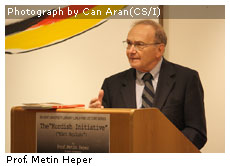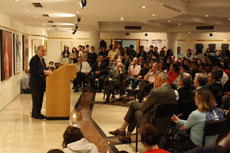 Professor Metin Heper, Dean of Faculty of Economics, Administrative and Social Sciences and Chairman of the Department of Political Science, gave the first Library Lunchtime Lecture of the 2009-2010 academic year at the Bilkent University Library on October 14, Wednesday. Prof. Heper discussed the ongoing debate around the "Kurdish Initiative" and how this debate has turned into a battle on matters such as the true meaning of the term "Turkish nation." He also addressed the question of whether the Turkish state has adopted an assimilation policy against its Kurdish citizens. Professor Metin Heper, Dean of Faculty of Economics, Administrative and Social Sciences and Chairman of the Department of Political Science, gave the first Library Lunchtime Lecture of the 2009-2010 academic year at the Bilkent University Library on October 14, Wednesday. Prof. Heper discussed the ongoing debate around the "Kurdish Initiative" and how this debate has turned into a battle on matters such as the true meaning of the term "Turkish nation." He also addressed the question of whether the Turkish state has adopted an assimilation policy against its Kurdish citizens.
In the first part of his presentation, Prof. Heper discussed what constitutes the root cause of the Kurdish issue in Turkey. He said there are several proposed solutions to this problem, but the appropriateness of the solutions highly depends on the accuracy of the assumptions that lie behind them. According to one assumption, the root of many problems is that the Turkish state has attempted to assimilate its Kurdish citizens against their will. Kurds resisted as a method of preserving their ethnic identity. The Kurds also resorted to rebellion, and the state suppressed their uprisings with force so it could go on with its assimilation policy.
"I do not agree with the idea that the Turkish state adopted an assimilation policy against its Kurdish citizens," said Prof. Heper. According to him, those who support that view think that the Turkish state denied the existence of Kurdish ethnicity. "The Turkish state, in fact, did not deny the existence of ethnic Kurds. The state refrained from an open recognition of the reality of Kurdish ethnicity, especially during the periods of rebellions, in the 1920s and 1930s," Prof. Heper said. "By adopting such a policy the state was planning to prevent Kurds from stressing their secondary identity, and turning their secondary identity into their primary identity. If the Kurds had started to underline their primary identity, they would have to claim that they now constituted a separate nation and they would have longed for their separate state."
 Prof. Heper next tried to explain the true meaning of the term "Turkish nation." He pointed out that Atatürk was of the opinion that having gone through a mutual acculturation process for long centuries, what the Turks and Kurds had shared was far more than those things on which they differed. He thus used the word "Turk" not as an adjective but as a generic name, as an umbrella concept, denoting the primary identity of all those peoples who at the time lived in Turkey and shared common cultural values. By doing so Atatürk was subscribing to cultural nationalism - people with similar visions, ideals, and values together making up a nation. Upon the proclamation of the Republic in 1923, civic nationalism was substituted for cultural nationalism; that is irrespective of religion and ethnicity, every citizen was now considered a genuine member of the Turkish nation. Prof. Heper next tried to explain the true meaning of the term "Turkish nation." He pointed out that Atatürk was of the opinion that having gone through a mutual acculturation process for long centuries, what the Turks and Kurds had shared was far more than those things on which they differed. He thus used the word "Turk" not as an adjective but as a generic name, as an umbrella concept, denoting the primary identity of all those peoples who at the time lived in Turkey and shared common cultural values. By doing so Atatürk was subscribing to cultural nationalism - people with similar visions, ideals, and values together making up a nation. Upon the proclamation of the Republic in 1923, civic nationalism was substituted for cultural nationalism; that is irrespective of religion and ethnicity, every citizen was now considered a genuine member of the Turkish nation.
However, Islam continued to constitute an important dimension in the value systems of the Turkish citizens. Consequently, in praxis, if not according to the Constitution (1924), cultural nationalism complemented civic nationalism. Prof. Heper supported his view by providing a short anecdote from our history: in the early 1930s, a Turkish Ambassador to Bucharest, Romania had found out that there were some Christian Turks (Gagauz) in Romania. The Ambassador wanted to encourage them to migrate to Turkey, but Ankara did not accept the Gagauz as Turks "since they were Christians." Later, the same state welcomed the Bosnians although the latter did not speak Turkish, but they were Muslims.
Prof. Heper also spoke about the harmony between Turks and Kurds and their integral unity. He supported this idea of his with the findings from two nation-wide surveys where respondents were Kurdish as well as Turkish citizens of Turkey. One question posed to the Kurds was whether they had favorable or unfavorable attitudes towards the Turks. The results have shown that 86.4 % of the respondents had favorable attitudes towards the Turks. Only 7.2 % said they harbored unfavorable attitudes. These results suggest that there exists little generalized hostility between Turks and Kurds in this country. Harmony is still preserved between citizens coming from different ethnic backgrounds.
Prof. Heper concluded his speech by noting that there seems to be a growing consensus that the Kurdish initiative should essentially comprise (1) putting a definitive end to terror; (2) providing additional individual, though not group (collective), rights to the Kurds (for such a group right as formal education in Kurdish would lead to the turning of secondary identities to primary identities); (3) further developing the socioeconomic situation of the region, and (4) no longer mal-treating the Kurds.
İsmail Uyanık (EE/V)

|







